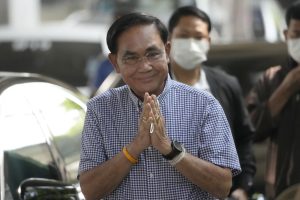In a span of hours yesterday, two events shook Thailand’s political landscape. First, after more than nine years in power, Thai Prime Minister Prayut Chan-o-cha formally announced his retirement from politics and resigned as head of the United Thai Nation Party (UTNP), ending an era that began with a military coup against the democratically-elected government of Yingluck Shinawatra in 2014. Second, Thailand’s Election Commission (EC) has sought the Constitutional Court’s ruling on whether Pita Limjaroenrat, the leader of the Move Forward Party (MFP), is qualified to sit in parliament due to his past ownership of shares in the defunct broadcaster iTV. Until that time, the EC has suspended Pita from his MP duties, even though the vote for prime minister will still occur tomorrow (July 13). Even if Parliament votes to approve Pita’s prime ministerial candidacy, the various legal obstacles to his premiership may be Prayut’s true legacy.
The courts have been a critical lever of power for the military and military-backed governments headed by Prayut. Within days of the 2014 coup, the National Peace and Order Maintaining Council, as the military junta christened itself, arrested hundreds of people, including journalists, human rights activists, opposition party leaders, political activists, and civilians who supported the Yingluck government. To facilitate their easier prosecution, Prayut replaced civilian courts with military tribunals.
French legal scholar Eugénie Mérieau once described Thailand’s judicial system as a “juristocracy,” designed to safeguard the country’s conservative institutions. The evolution of the Constitutional Court is a case in point. Established in 1997, its powers were amplified under the country’s current 2017 Constitution, which was drafted by Prayut’s junta and approved in a flawed referendum. This gave it the authority to disband political parties that create what the state deems to be a crisis, and any that attempt to “overthrow the democratic regime of government with the King as head of State.”
Although Prayut was not involved in the Constitutional Court’s creation, he used it as a means of silencing his critics and defending conservative interests. In 2019, the Court dissolved the opposition Thai Raksa Chart Party for proposing Ubolratana Mahidol, the sister of King Vajiralongkorn, as its prime ministerial candidate for the March 2019 election. In 2020, it dissolved the Future Forward Party, the predecessor of the MFP, and banned its leader, Thanathorn Juangroongruangkit, from politics for 10 years.
The court also allowed Thammanat Prompao, a minister in Prayut’s cabinet, to keep his job despite a past conviction for drug trafficking, on the grounds that the verdict was delivered in Australia rather than Thailand. In November 2021, the Court ruled that protesters calling for reform to Thailand’s monarchy had abused their “rights and freedoms” and “harmed the state’s security.”
Most recently, in 2022, the Constitutional Court ruled that Prayut could stay in power until 2025, crushing opposition hopes that he had already exceeded his eight-year term limit by appointing himself prime minister in 2014. Along the way, Prayut’s junta also extended the terms of the Court’s judges before their terms came to an end, in order to preserve its hold over the crucial institution.
With Prayut’s retirement, Pita now faces the consequences of his judicial legacy. For example, one of the challenges thrown at him is the petition filed by lawyer Theerayut Suwankesorn, who claims that by aiming to dismantle Thailand’s repressive lese-majeste laws, Pita and the MFP have violated Article 49 of the Constitution, which prohibits the Thai public from overthrowing the Kingdom’s constitutional monarchy. Under Prayut, the use of the lese-majeste law proliferated, and nearly 200 people have been charged with insulting the monarchy on his watch, including children, musicians, and opposition politicians like Thanathorn.
Military-aligned activists, like UTNP member Sonthiya Sawasdee and political activist Ruangkrai Leekitwattana have long demanded that the EC send the case against Pita straight to the Constitutional Court, perhaps confident on how it is likely to rule.
The Constitutional Court, its powers enhanced and manipulated by Prayut, has long-departed from the limited judicial independence it once possessed. Like most Thai institutions, it is bound by the ideology that it must defend conservative traditions, including the power of the monarchy and the taboo against subjecting it to any public scrutiny.
Pita now finds himself going head to head with an institution politicized and unfairly stacked against him. Even if he miraculously survives his current legal challenges, the MFP leader will surely face many more legal and constitutional obstacles as prime minister. When, if ever, has the Constitutional Court ruled in favor of an opposition political party? Evidence to the contrary being scarce, Mérieau’s claims about Thailand’s “juristocracy” continue to ring true.
































